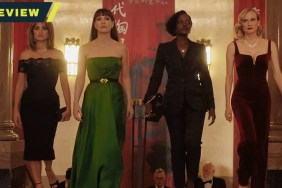
6 out of 10
Cast:
Jessica Chastain as Antonina Żabińska
Johan Heldenbergh as Jan Żabiński
Daniel Brühl as Lutz Heck
Michael McElhatton as Jerzyk
Iddo Goldberg as Maurycy Fraenkel
Shira Haas as Urszula
Efrat Dor as Magda Gross
Val Maloku as Ryszard Żabiński
Tim Radford as Young Ryszard Żabiński
Goran Kostić as Mr. Kinszerbaum
Directed by Niki Caro
The Zookeeper’s Wife Review:
Jessica Chastain deserves better than this. Film after film she has lent excellent performances to try and prop up poorly-conceived or executed (or both) films. The Zookeeper’s Wife, adapted from Diane Ackerman’s beloved book about the real Antonina Żabińska, is unfortunately the latest in that line. Despite what appears to be the best of intentions from all involved, including committed performances from Chastain and Heldenbergh as her husband, the result is unfortunately bloodless and cool, turning a great success amid a great horror into an anecdote rather than a triumph.
Antonina and her husband Jan are the owners of the Warsaw Zoo, the envy of European zoologists in pre-WWII Europe. With coming of the war and the fall of Poland to the German Reich, however, those circumstances change. As Christians, they’re spared their reality of the Holocaust, viewing it with sympathy but dispassion, keeping their heads down and waiting for the world to go back to normal. When it becomes clear that will not happen, they decide they can no longer stand by and watch and begin using the vast and now empty grounds of the zoo as a hiding place for refugees smuggled from the Warsaw Ghetto. It’s a foolproof plan except for the Chief German Zoologist (Brühl) who visits often – partly from his infatuation with the zoo and the bison he wants to breed there and partly from his infatuation with Antonina, leaving her to decide how far she will go to protect the people relying on her.
Director Niki Caro has been drawn to narratives about marginalized people struggling against larger enveloping cultures – from the Mauri’s of her breakthrough film Whale Rider to the working women of North Country and the immigrant laborers of MacFarland, USA – so the plight of the Polish Jews during the Holocaust should be a perfect fit for her. She’s also had a tendency to make her protagonists flawless by way of unexamination (in order to add to the saintliness of their suffering) and her antagonists unempathetic. The results are films which can and do easily fall prey to emotional manipulation, and while Caro is hardly the only director to fall prey to this temptation, her subject matter usually deserves better.
There have been a hoard of films using the Holocaust as either their subject or backdrop or both. The natural drama and horror of the event makes this inevitable, the best and worst elements of human nature being put on display and in close proximity. That also means for as many triumphs of drama come out of it, there have been plenty which used it for the short hand emotional thrust without care for the reality of the event. Zookeeper’s Wife does not fall to the level of Holocaust porn of something like Jakob the Liar, but its dispassionate view of the material keeps the audience from experiencing the horror the narrative is clearly trying to convey. It only manages such moments sparingly, particularly during an evocative sequence when Jan must watch Jewish children reach up with trusting arms to be loaded on the trains for Treblinka, Dachau and Auschwitz. The Zookeeper’s Wife never manages such depths of emotion again.
Which isn’t to say it’s bad or difficult to watch. It’s well designed and shot by Oscar-nominated production designer Suzie Davies and cameraman Andrij Parekh, managing the tricky balancing act of being neither too pretty nor too ugly. And though Brühl is left to be an almost literal mustache-twirling villain, Chastain and Heldenbergh are effective and affecting zookeepers, but they’re always swimming upstream, particularly Chastain as Antonina is more nurturing than proactive, leaving much of that to her husband. The episodic nature of the story, combined with placing it entirely through their viewpoints, creates a story which often feels free of consequences. Think of that, a story of the Holocaust with no consequences, where nothing is too dearly paid for. Even when Jan joins the Polish Resistance, it is treated more as an afterthought. A victory without price is difficult to cherish and The Zookeeper’s Wife is just that: a hollow victory.
The Zookeeper's Wife
-
The Zookeeper's Wife

-
The Zookeeper's Wife

-
The Zookeeper's Wife

-
The Zookeeper's Wife

-
The Zookeeper's Wife

-
The Zookeeper's Wife










